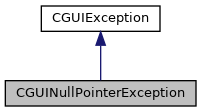CGUINullPointerException Class Reference
This exception can be used to indicate the errors if a pointer is null. More...
#include <GUINullPointerException.h>
Inheritance diagram for CGUINullPointerException:

Public Member Functions | |
| CGUINullPointerException (const CGUINullPointerException &kSource) | |
| CGUINullPointerException (const eC_String &kNullPointerName) | |
| ~CGUINullPointerException () | |
| CGUINullPointerException & | operator= (const CGUINullPointerException &kSource) |
| virtual eC_String | Report () const |
 Public Member Functions inherited from CGUIException Public Member Functions inherited from CGUIException | |
| CGUIException () | |
| virtual | ~CGUIException () |
| virtual eC_String | Report () const |
Detailed Description
This exception can be used to indicate the errors if a pointer is null.
Constructor & Destructor Documentation
◆ CGUINullPointerException() [1/2]
| CGUINullPointerException::CGUINullPointerException | ( | const eC_String & | kNullPointerName | ) |
Standard-constructor.
- Parameters
-
kNullPointerName Name of the exception
◆ ~CGUINullPointerException()
| CGUINullPointerException::~CGUINullPointerException | ( | ) |
Destructor.
◆ CGUINullPointerException() [2/2]
| CGUINullPointerException::CGUINullPointerException | ( | const CGUINullPointerException & | kSource | ) |
Copy-constructor.
- Parameters
-
kSource Source object to be copied.
Member Function Documentation
◆ operator=()
| CGUINullPointerException & CGUINullPointerException::operator= | ( | const CGUINullPointerException & | kSource | ) |
Operator= method.
- Parameters
-
kSource Source object to be copied.
- Returns
- This instance.
◆ Report()
|
virtual |
Report the message of the exception.
- Returns
- The message of the exception.
Reimplemented from CGUIException.
The documentation for this class was generated from the following file:
